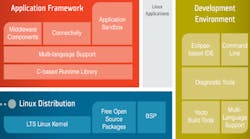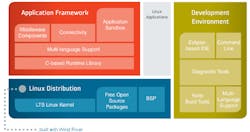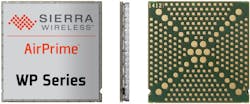Sierra Wireless' Legato (Fig. 1) is designed to make creation of devices for the Internet of Things (IoT) easier. Legato targets Sierra Wireless' AirPrime WP modules that runs a version of Linux co-developed with Wind River. The system incorporates open source tools like the Yocto build tools and the Eclipse integrated development environment (IDE).
Sierra Wireless AirPrime WP modules (Fig. 2) are compact wireless devices that are ideal for building IoT applications. They are based on ARM926 or Cortex-A5 microcontrollers with a separate telecom core for communication support. The WP710x uses Qualcomm’s Gobi 9x15 chipset with 3G/4G support. The modules have multiple I/O ports including GPIO, SPI, I2C and USB. They also have multichannel ADCs.
The AirPrime WP modules are sup
Related Articles
- Machine-to-Machine Q and A With Sierra Wireless
- M2M Framework Runs Third Party Lua Scripts
- Embedded M2M Wireless Modules Flexible Across 2G-3G-4G
ported by Sierra Wireless’ AirVantage Management Service and AirVantage Enterprise Platform. AirVantage provides REST APIs for accessing cloud-based data.
Legato includes AirVantage support but the tools and toolkit are more general allowing developers to take advantage of Sierra Wireless’ cloud support or incorporating their own.
Legato starts with Linux based on a long term supported Linux kernel and a board support package (BSP) that can be easily rebuilt using Yocto build tools. The base includes support for Linux packages like BusyBox and OpenSSH.
Sierra Wirelesss adds C-runtime library and middleware components including network and cloud-based communication services. This supports applications written in a range of languages starting with C and C++.
The application sandbox is designed to limit resources including file access, memory and execution time so applications can be isolated and not impact the rest of the system if they fail. This is a user level isolation mechanism rather than a hypervisor virtual machine isolation system.
The Eclipse-based Sierra Wireless Developer Studio adds advanced debugging support. The Yocto tools can easily rebuild the system. IDE and command line support is included.



